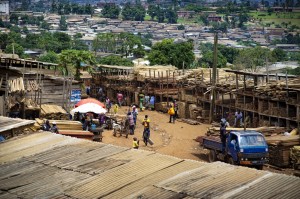
Down a rough dirt track, through the shade of a cacao plantation, and into a humid patch of Cameroon’s tropical forest, researchers from the Center for International Forestry Research (CIFOR) follow the sound of a chainsaw.
In a small clearing they find 58-year-old Dieudonné Ngomo (not his real name), shirtless and hard at work. His operation is just a tiny part of Cameroon’s vast informal timber market. As he expertly carves a fallen tree trunk into planks, Ngomo explains to the researchers just how important logging work is for rural incomes.
“It is a job that allows a lot of families to live,” he says, hefting a plank onto the head of a teenager waiting to carry the plank out of the forest. “Not everyone is able to create a cacao plantation, a man might not be able to be a sawyer like me, but his strength enables him to be carrier,” he says. “And this allows him to survive.”
But Ngomo has to hide to do his work. He says he wants to obtain a legal logging permit – but no one can tell him how to get one.
Ungoverned, uncontrolled, understudied
In 1999, the government suspended all small-scale logging titles until 2006. Despite that, the country’s domestic timber market exploded – ungoverned, uncontrolled, and particularly understudied.
Until CIFOR, funded by the Dutch Ministry of External Affairs (DGIS), the International Fund for Agricultural Development (IFAD), and especially the European Commission (EC), began researching Cameroon’s informal timber market in 2008, no one knew just how significant it was. What was found surprised everybody.
Informal chainsaw logging accounts for almost the same volume of timber as Cameroon’s large formal export market – but it employs four times as many people and is linked to a widespread network of corruption. “It was not only a surprise for us but also for the administration and for the people we work with in Cameroon,” says CIFOR’s Hub Leader in Cameroon, Richard Eba’a Atyi. The volumes were considerable.
The information became of critical importance when the Government of Cameroon negotiated a Voluntary Partnership Agreement (VPA) as part of its adherence to the EC’s Forest Law Enforcement, Governance, and Trade (FLEGT) Action Plan. Cameroon insisted that not only the export timber market but also the domestic market be considered in the legality system that was being discussed
“The measures and tools that will be specifically designed to deal with the domestic timber market have been largely influenced by CIFOR’s research,” says Marc Vandenhaute, one the EC technical advisors to Cameroon at the time.
“If coupled with a strong political will to improve the governance of the sector, those measures will help a successful implementation of the VPA and the formalization of chainsaw milling and the domestic timber market.”
Legalizing African domestic timber markets
Thanks to EC funding, CIFOR research into informal logging has expanded into Gabon, the Democratic Republic of Congo, Ecuador and Indonesia. The research project is called Pro-Formal.
Results indicate that chainsaw milling and domestic timber markets are of comparable importance in those countries. CIFOR has offered policy options to assist countries to formalize these markets. The research is highly valued by Cameroon’s Government.
“The are a lot of anomalies in this sector. Our commitment [under FLEGT] is that we cannot clean up the exporting sector without considering the local market,” says the Secretary General of Cameroon’s Ministry of Forestry and
Wildlife, Denis Koulagna Koutou. “We cannot have sustainable development of our natural resources without viable data,” he says. “CIFOR was the first in the sub-region to embark on a long-term study, and provide good quantitative research which has allowed us to identify where there are problems.”
Download Pro-Formal brochure here
Also see Once ‘invisible,’ Africa’s domestic loggers come into the light











